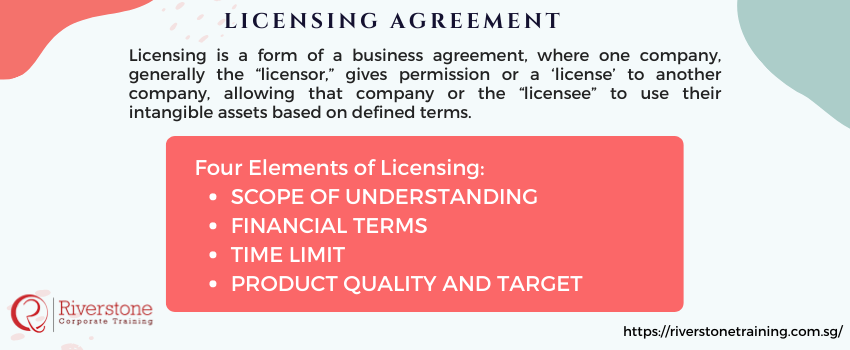
What is Licensing?
Licensing is a form of a business agreement, where one company, generally the “licensor,” gives permission or a ‘license’ to another company, allowing that company or the “licensee” to use their intangible assets based on defined terms. These intangible assets are generally the intellectual property rights, as the name of the brand, the copyright, the trademark, technology, etc. it’s basically when the “licensor” company allows the “licensee” to use their assets in their ways to sell a product in a particular place. In return, the “licensor” company gets a fee or revenue share or profit share from the “Licensee,” which helps in the branding, marketing, or administration costs of the product.
Difference Between Licensing and Franchising:
| LICENSING | FRANCHISING |
| 1.By definition, we can say that licensing is when a company sells the right to use its intellectual property to another company in exchange for a royalty.
2. No registration is necessary. 3. No training or support provided 4. The licensor controls the use of intellectual property by the licensee but does not manage the independent business. 5. It does not require any help from the licensor. 6. The fee structure or the royalty involved is negotiable, unlike Franchising. |
1.Franchisor permits the Franchisee to use the business model or brand name for a certain amount of money, but the franchisee can conduct the business independently.
2.Registration is mandatory. 3. Training and support provided. 4. The franchisor has considerable influence and authority over the Franchisee’s business and process. 5. Requires constant assistance and training from the franchisor. 6. The fee structure is pretty standard. |
Four Elements of Licensing Agreement:
- SCOPE OF UNDERSTANDING: Some of the most critical issues finalized in the agreements are territory rights, exclusivity, the responsibility of licensor and licensee, legal jurisdiction, liabilities, guarantees of sales etc.
- FINANCIAL TERMS: This is one of the essential elements in a licensing agreement. The Financial agreement deals with the fees calculation, costs sharing, distribution of fees etc. It determines how much the licensee will pay the licensor for every product sold, or a similar arrangement.
- TIME LIMIT: The time limit is another essential element of the licensing agreement. When any contract formed, it sealed with a time limit, terms of renewals, the validity of the transaction etc. It also specifies if the license will be renewed or it will be void at the end of the contract period.
- PRODUCT QUALITY AND TARGET: This mainly deals with the quality of the products and services that are being sold under the Licensor’s name. It includes the design, ingredient, services, outlet standards etc. related to product or services. It also contains the timelines for the launch of the product and services and the target to be achieved in the defined period



